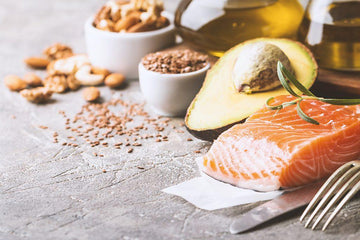Fats are an important part of our diet and play numerous roles in the body. Although they are often perceived as unhealthy, there are fats that are essential for many bodily functions. This article explains the different types of fats, their functions and how to incorporate them into a balanced diet.
Types of fats
There are different types of fats that play a role in the diet:
1. Unsaturated fats:
• Monounsaturated fatty acids (MUFA): These fats are found mainly in vegetable oils such as olive oil, avocado oil, as well as in nuts and seeds.
• Polyunsaturated fatty acids (PUFA): These fats are found in foods such as fatty fish (eg salmon), walnuts and flax seeds. They also include omega-3 and omega-6 fatty acids.
2. Saturated fats:
•Saturated fats are found in animal products such as meat, butter, cheese and whole milk, as well as in some vegetable oils such as coconut and palm oil. They should be consumed in moderate amounts.
3. Trans fats:
•Trans fats are mainly produced during industrial processing of food, especially during the partial hydrogenation of vegetable oils. They are found in many processed foods such as baked goods and fried products. It is recommended to minimize the consumption of trans fats.
Functions of fats in the body
Fats have several important functions in the body. They help maintain cell structure, play a role in hormone production and are involved in the absorption of fat-soluble vitamins such as A, D, E and K. In addition, they are a concentrated source of energy.
Foods with healthy fats
1. Avocado:
•Avocados contain monounsaturated fatty acids. They can be used in many ways, e.g. as a spread, in salads or smoothies.
2. Nuts and seeds:
•Walnuts, almonds, flax seeds and chia seeds are rich in unsaturated fats, proteins and fibre. They are great as a snack or ingredient in various dishes.
3. Fatty fish:
•Salmon, mackerel, herring and sardines contain omega-3 fatty acids. It is recommended to regularly include fatty fish in your diet.
4. Olive oil:
•Olive oil, especially extra virgin olive oil, contains monounsaturated fatty acids and antioxidants. It is excellent for cooking and in salad dressings.
5. Chia and flax seeds:
•These seeds are good sources of omega-3 fatty acids and fiber. They can be used in smoothies, yogurt or as a topping.
6. Dark chocolate:
•Dark chocolate with a high cocoa content contains healthy fats and antioxidants and can be enjoyed in moderation.
7. Eggs:
•Eggs contain a combination of saturated and unsaturated fats as well as important nutrients such as vitamin D and choline.
Integrating healthy fats into your diet
To benefit from the functions of healthy fats, they should be regularly integrated into the diet. Some tips are:
• Use healthy oils: Cook with olive oil or avocado oil.
• Nut-based snacks: Nuts and seeds provide healthy fats and make great snacks.
• Adding Avocado: Avocado can be used in many dishes to increase the fat content in a healthy way.
• Enjoy fatty fish: Plan to include fatty fish in your diet regularly.
Conclusion
Healthy fats are an important part of a balanced diet and support various body functions. By consciously integrating unsaturated fatty acids and reducing the consumption of trans fats, you can improve your diet. Fats are not only sources of energy, but also important for cell structures and other essential processes in the body.





